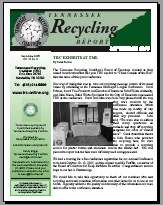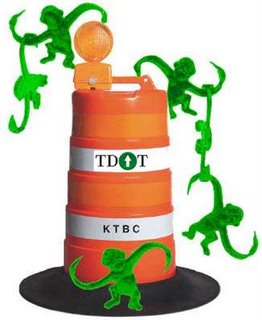
U.S. Senator Jim Jeffords, VermontNovember 17, 2003
Senator Jeffords' Floor Statement on the
National Beverage Producer Responsibility ActMr. President, like every loyal Red Sox fan, I believe that next season, my team will be victorious. I bring this same level of optimism to my efforts to reduce the amount of wasted resources and litter caused by discarded beverage containers.
I rise today to introduce the National Beverage Producer Responsibility Act of 2003, the Bottle Bill, convinced that this is our year. I have long been an advocate for increased recycling.
Vermont passed its Bottle Bill in 1972 when I was state Attorney General. In 1975, during my first Session as a Representative in the U.S. House, I introduced a national Bottle Bill, closely resembling Vermont's very successful example.
Last Congress, as Chairman of the Environment and Public Works Committee, I convened the first Congressional hearing in many years on recycling, in which the Committee heard expert testimony on the merits of a national program to recycle beverage containers.
The reason that I continue to push this issue is simple – it makes sense. Beverage container recycling is one of the simplest ways to see a dramatic improvement in our environment. As this chart shows, 120 billion – let me repeat, 120 billion with a "B" – beverage containers were wasted by not being recycled in 2001.

If we could raise the nation's recycling rate to 80 percent, we would save the equivalent of 300 million barrels of oil over the next ten years and eliminate 4 million tons of greenhouse gas emissions annually. States that have enacted bottle bills also have benefited by reducing road side litter by up to 84 percent.
These savings may sound unrealistic. But, in Vermont alone, recycling efforts in 2001 reduced greenhouse gas emissions by 94,000 metric tons of carbon equivalent. That's equal to approximately two-thirds of all industrial carbon dioxide emissions from fossil fuel combustion in Vermont and 4.5 percent of greenhouse gas emissions. To me, those savings sound remarkable.
Why a refundable deposit program? Thirty years of experience demonstrates that refundable deposit bottle bills are dramatically more effective than voluntary efforts. As this chart illustrates, the ten states that have implemented deposit laws recycle more containers than all of the other 40 states combined. While I applaud curbside and other voluntary recycling efforts, the 71 percent of Americans who live in non-bottle bill states account for only 28 percent of recycled beverage containers.

My bill, the National Beverage Producer Responsibility Act of 2003, strikes a balance between the wishes of industry, the authority of individual states, and the needs of a healthy environment. Unlike traditional bottle bills, this legislation would fully harness market incentives by setting an 80 percent recovery performance standard and allowing industry the freedom to design the most efficient deposit-return program to reach the standard. States that already have bottle bills will retain their authority to continue their programs in their own individual ways as long as they meet the national performance standard.
This past Saturday, November 15, 2003, was America Recycles Day in Vermont and across the country. Two years ago, to help commemorate the 2001 America Recycles Day, I participated in a public service announcement to raise awareness regarding the need to buy recycled goods. The importance of recycling deserves, however, more than a 30-second public service announcement and more than its own day on the calendar.
For it to work, recycling must be a commitment of all of ours each and every day of the year. Vermont's commitment to recycling has provided some impressive statistics. For example, in 2001, 31 percent of Vermont's municipal waste was diverted from landfills. That year, 13,260 tons of containers were recycled through soft drink and beer distributors and materials recovery facilities. The benefit of these programs is, of course, that they help keep our Green Mountains green.
I commend and thank Governor Jim Douglas for his many recent initiatives to encourage and improve the efficiency of recycling across Vermont. For example, under Governor Douglas' leadership, Vermont has implemented beverage container recycling programs at 20 state information centers. In the first phase, in less than two months, over 200 pounds of aluminum, glass, and plastic were recovered from 51,000 visitors passing through one such information center in Williston, Vermont.
And today, the U.S. Senate's other Vermonter,
Patrick Leahy, joins me and
Senators Joseph Lieberman, Daniel Akaka, and
John Kerry as original cosponsors as I introduce the
National Beverage Producer Responsibility Act of 2003.



